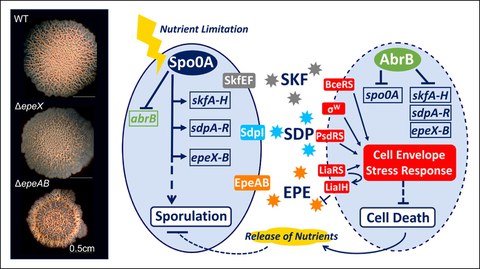Lena Friebel
 © Sven Ellger/TUD
© Sven Ellger/TUD
PhD Student
NameLena Friebel M.Sc.
Mascher Group
Send encrypted email via the SecureMail portal (for TUD external users only).
Research
Cannibalistic Bacillus subtilis - The role of programmed cell death for the structuring and functionalization of differentiated multicellular populations
In colonies of the bacterium Bacillus subtilis, cannibalism plays a central role in the structuring and functionalization of differentiated, multicellular populations. Certain cells within a bacterial colony are able to release antimicrobial peptides, so-called cannibalism toxins, which kill neighboring cells. However, the producers themselves are protected by autoimmunity. The killing of part of the population leads to the release of nutrients that ensure the survival of the remaining cells and have a sporulation-delaying effect. These mechanisms allow the bacterial community to optimize its structure and react flexibly to environmental changes. This is a decisive factor for survival in a highly competitive habitat such as soil.
The basis of cannibalism is the production of at least three toxins, the Sporulation Killing Factor SKF, the Sporulation Delaying Protein SDP and the recently described Epipeptide EPE. The present results suggest that SDP and EPE, but not SKF, significantly influence the shape of Bacillus colonies.
The overall aim of the interdisciplinary research project is to elucidate the role of programmed cell death, mediated by cannibalism toxins and other secondary metabolites, in the structure and function of differentiated B. subtilis colonies.
The project is part of the priority programme SPP2389 "Emergent Functions of Bacterial Multicellularity" funded by the German Research Foundation (DFG). The aim of this programme is to establish the concept of bacteria as multicellular microorganisms that live, at least temporarily, in stable and highly organized tissue-like populations.

